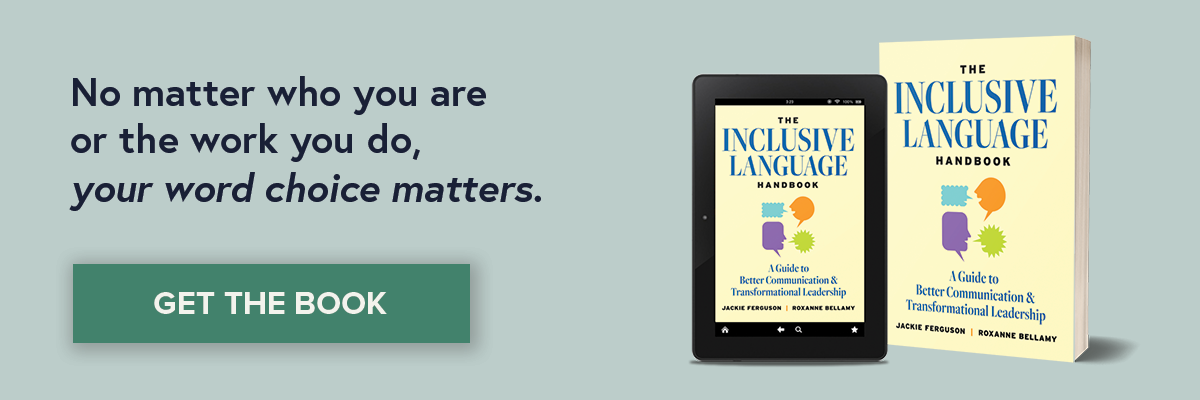Business leaders know that communication is essential to success. You might take time to polish your presentations and sales pitches, but what about your everyday conversations? And what about the rest of your staff? All these casual interactions can say a lot about company culture.
In fact, the words you choose can make or break your business, especially in the retail industry. Inclusive language can help you attract customers, build consumer loyalty, increase brand awareness, and retain talented employees. Knowing how to communicate in a welcoming and respectful way is an essential skill for every member of your organization – from CEO to sales associate.
Inclusive language and customer service power retail success
Inclusive language reflects an openness toward other people’s differences. It means knowing how to speak respectfully of other cultures, communities, identities, experiences, and backgrounds. The right words make people feel welcome and respected, and because of this, inclusive language will help you attract, serve, and keep your customers.
Retail customers have lots of choices, from Amazon to the neighborhood boutique. When shoppers feel welcome and respected, they will choose your business over and over. But success doesn’t stop with one happy customer. Word-of-mouth advertising and 5-star social media reviews have exponential benefits for online retailers and brick-and-mortar shops alike.
In this way, a service-minded culture can give you a long-term competitive edge.
“Customer experience and service are the only real competitive advantages for online or store-based brands,” says Phil Kowalcyk, a retail and consumer products consultant.
“Retail is about welcoming people and making them feel they want to be part of your business. The primary way we welcome people is grounded in the language we use, so getting educated on inclusive language is a game-changer for retailers,” adds Kowalcyk, who has served as president or CEO of three major retail brands: L’Oréal/Body Shop, J. Jill, and The Robert Allen Group.
Successful retailers know that the products they sell, where they sell them, who does the selling, and how they advertise must all be designed with diversity and inclusion in mind. Word choice is an essential element of this mix. In short, choosing the right words helps retailers reach a bigger market and build loyal customer relationships.
Inclusive language requires practice
Putting inclusive language into practice is just that – practice. Some words and phrases are so ingrained that it’s difficult to break the habit of using them, even though you know there are better, more inclusive choices.
For those in customer service, “ma’am” and “sir” are two of those problematic responses. Especially if you were raised in or transplanted to the South, it’s difficult to stop saying “Thank you, ma’am” and “Yes, sir.”
“Because you grow up saying, ‘Hello ma’am’ or ‘Thank you, sir,’ not saying that feels like there’s something missing,” says Dr. Dana Riger, Clinical Assistant Professor of Human Development & Family Studies at the University of North Carolina at Chapel Hill.
To break the habit, she suggests practicing responses that fill the now-empty space where your brain wants to put gendered forms of address. Instead of saying, “Thank you, sir,” you can say, “Thank you so much. Have a great day.” Or instead of saying, “Yes, ma’am,” say, “Yes, indeed.”
“If we’re going to change the culture around gender assumptions or inclusivity, there are going to be some growing pains,” she says.
Don’t be afraid of making mistakes
In fact, even the best-intentioned speaker will make mistakes. When they happen, admit the mistake, apologize, correct yourself, and move on.
Kerry Andolina, head of human resources and global diversity at Comme des Garçons/Dover Street Market, says there were common mistakes as her organization launched its recent focus on inclusive language.
“‘Hi, guys’ has been a struggle across the board,” she says. “At first, I could see ‘they/them’ was a struggle for a lot of people, especially if they didn’t have associates before that identified as they/them, and they needed to practice.”
Inclusive language awareness at Dover Street Market, a global luxury retail brand, has been a journey, Andolina says. The organization had offered DEI training for managers for years and assumed that the information was being passed along to associates. When a recent assessment showed that wasn’t happening in a meaningful way, Dover Street revamped its DEI training program.
“We needed to take a step back and also talk to managers about how they approach these conversations with their staff,” she says. “As we continue as leaders in the company to show our commitment and our stance behind inclusive language, everyone else is also being much more intentional about it.”
Among the changes have been company-wide presentations and targeted training, which have raised awareness about inclusive language.
“We’re not always going to have the answer, and what works now might not work in the future,” Andolina says. “I have a couple of employees and their pronouns are ‘they/them.’ If you do slip and you say ‘he’ or ‘she,’ acknowledge it, and catch yourself in the moment instead of trying to gloss over it. A big part of the learning and the discovery here is to acknowledge the slip-up or mistake, and try to do better next time.”
Six practical language guidelines for the retail industry
An intentional focus on language, a willingness to practice, and the courage to learn from mistakes will help any team become more comfortable using inclusive language. Here are a few more practical tips:
- Drop gendered language. To avoid misgendering your customers, avoid all gender-specific greetings, such as “ladies” and “gentlemen,” and use “everyone” or “you all” instead.
- Examine your product descriptions. Language choices could reveal bias about the end-consumer. Men wear makeup and nail polish. Women use grills and play video games. LGBTQ+ couples create wedding registries and buy matching sets of pajamas, coffee mugs, and so much more. Using gender-free terms not only makes all people feel welcome and included but also expands your market reach.
- Avoid culturally-specific figures of speech that customers who don’t speak English may find difficult to understand.
- Always explain jargon. Terms like “out of stock, “back ordered,” and “contactless payment” may feel commonplace to you, but could leave your customers confused and feeling excluded.
- Insist on digital accessibility for your website, mobile app, and any other digital systems, processes, or tools. Test your content using the Flesch-Kincaid readability test to make sure customers of all reading levels are included.
- Accept diverse body types. Pay attention to the words you’re using to describe people’s bodies, like “plus size” “junior,” and “skinny mirror,” and work toward more body-positive terminology that rejects the idea of some bodies being “normal” and others being abnormal.
When cultures mix, respectful communication is vital
Because Dover Street Market is a world-wide brand, there are also cultural differences to consider. There is no uniform policy on standards of communication. Instead, everyone is encouraged to be mindful of cultural nuances and to extend understanding and grace when interacting with colleagues from other cultures.
For example, a prime office spot in the United States would be seen as less prestigious in Japan, where work culture is quite different.
“I was moving our desks around in the office, and a couple of people were so excited, because they were going to have a window seat,” Andolina says. “Our vice president said, ‘Do you know what they call that in Japan? They’re referred to as “window workers.”’ They put their least performing people next to the windows, because they know all they’re going to do is gaze out the window all day long, and not get work done.”
She has also heard executives visiting from France casually ask someone their nationality. Where were they born? What are their origins? These questions are seen as commonplace in places outside the U.S., Andolina says, like making a remark about the weather. When this happens, corrections are made smoothly and without fuss.
“In the U.S., people aren’t going to appreciate those questions,” she says “They might be okay with it, but you’re risking that they’re not going to be okay with it. And as an executive, you need to not ask those questions.”
Brand reputation and customer loyalty
As well as using inclusive language in conversation, it’s also important to be inclusive in any written communication. Because marketing and advertising last longer and reach more than one person, an organization’s brand needs to reflect its commitment to diversity and inclusion.
Retailers that use inclusive language in their corporate communications signal to consumers that they are committed to DEI values. This is increasingly important as a growing number of consumers are choosing to shop with retailers that acknowledge their personal identities and actively support social causes that promote diversity, equity, inclusion, and accessibility. In fact, in a recent survey from McKinsey, two out of three Americans said their social values now shape their shopping choices.
While not a retailer per se, MasterCard’s True Name program shows that language choices matter. MasterCard allows people who are transgender or nonbinary to use their chosen name on their credit card, even before they have changed their name legally. When companies support their customers’ identities in respectful ways like this, they can build brand reputation and customer loyalty.
Bottom-line benefits: happiness, retention, and one person’s story about leaving and returning
In addition to the benefits listed so far, making inclusive language a priority has other advantages. Beyond client experience, customer loyalty, and brand reputation, the practice can encourage an inclusive company culture. Implementing inclusive language practices – along with other DEI strategies – help retailers hire and keep talented employees.
At Dover Street Market, Andolina says the company’s annual survey showed improvements in employee retention and satisfaction. These happy employees were more productive and better able to serve customers.
“Employees in general are saying that they are happier here at work and feel like they can be their authentic selves,” she says. “The direct impact of them feeling comfortable, wanting to come to work, feeling like they have allies here within the company, they’re then ultimately putting their best foot forward to our clients and our vendors. That impacts our sales and how well we do.”
As an example, Andolina relates an incident involving a store manager who resigned, shifting to another fashion company that offered more money and a promotion.
“He was there for three days, and he called and asked for a meeting,” she says.
“We met for coffee, and he said, ‘Dover Street Market is truly the only company I’ve worked in within the fashion industry where I could be my true self and it was okay. And I didn’t have to hide something about myself. I didn’t have to change the way I dressed. I didn’t have to be ashamed that I was a Black man in fashion.’
“He asked if he could come back. He returned within only a couple of days of leaving the company.”
This anecdote shows that the inclusive company culture at Dover Street Market is nothing new. Also baked into the company culture is the realization that DEI is a journey, and there are always ways to get better, like focusing on inclusive language.
“In the past year, we’ve really been able to see how focusing on this can impact our company as a whole,” Andolina says. “We are back to doing our pre-pandemic numbers in terms of sales, and I do attribute it to our staff really wanting to be here, wanting to be happy, wanting to see a company succeed that stands behind them.”
At Dover Street Market, inclusive language has improved company culture, employee retention, and customer satisfaction. And, results like these aren’t unusual. If you could use some help making your language more inclusive, be one of the first to order our book on the topic: The Inclusive Language Handbook: A Guide to Better Communication and Transformational Leadership.
Amber Keister is a Content Writer and Editor at The Diversity Movement. She has spent more than 20 years as a journalist for publications throughout the South. Connect with her on Linkedin.







